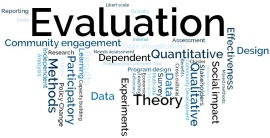 The evaluation discipline and practice are generally guided by four main evaluation schools of thought or paradigms. They are namely (1) the post-positivist (known as the method-driven), (2) the pragmatist (mostly referred to as the use or utilization-based), (3) the constructivist (best captured as the value-driven) and (4) the transformative paradigm that is too entrenched in the values and principles of equity and justice. I will try to provide a snapshot of these four main evaluation paradigms over a series of 2 to 3 short blogs, describing the key foundations, and taking stock of the similarities and differences among them.
The evaluation discipline and practice are generally guided by four main evaluation schools of thought or paradigms. They are namely (1) the post-positivist (known as the method-driven), (2) the pragmatist (mostly referred to as the use or utilization-based), (3) the constructivist (best captured as the value-driven) and (4) the transformative paradigm that is too entrenched in the values and principles of equity and justice. I will try to provide a snapshot of these four main evaluation paradigms over a series of 2 to 3 short blogs, describing the key foundations, and taking stock of the similarities and differences among them.
To do so, however, it is useful to shed light on Thomas Kuhn’s conception of the notion of “paradigm”. Conceived in his masterpiece “The Structure of Scientific Revolution”, the paradigm is “the entire constellation of beliefs, values, techniques, and so on shared by the members of a given community” (Kuhn, 1970). In other words, in a paradigm, the community of researchers share common construct of reality with all its axiological (values and ethics), ontological (assumptions about the nature of reality and knowledge), epistemological and methodological assumptions.
Adopting a paradigm necessitates the presence of anomalies that culminate into a crisis that disturbs the existing theories, concepts and other means of understanding. To survive the crisis, scholars and researchers conceive new beliefs, values, and methods; and build a faith that the newly conceived “paradigm” explains the anomalies and that it “will succeed with the many large problems that confront it” (Kuhn, 1970, p.158). Despite the resistance of the scientific and research community, the existing paradigm collapses when the new paradigm proves its ability to yield new axiological, ontological and epistemological assumptions, as well as methodologies that are capable to explain the current manifestations. For Kuhn, two paradigms never coexist. The vanishing paradigm exhibits an “incommensurability” (incompatibility) with the emerging one that will take over to the extent that “the whole profession will again be practicing under a single, but now a different, paradigm” (Kuhn, 1970, p.152).
While in scientific revolution, paradigms do not co-exist, given the existing paradigm’s inability to provide answers to emerging anomalies, it is noticed that in most social science disciplines (evaluation included), paradigms cohabitate. In evaluation research particularly, Daniel and Wirth noticed that “experimentation did not vanish from paradigm to paradigm, but changed its emphasis and application with each paradigm” (Daniels & Wirth, 1983)
Studying the different paradigms is better informed when exploring the underpinning philosophical assumptions about their (1) axiology (the ethics and value systems on which it is founded), (2) ontology (mostly concerned with the nature of social reality (i.e. addressing what do we believe about the nature of reality?), epistemology (that inquires about the nature of knowledge and the ways to know (i.e. what are the sources of knowledge and how do we know what we know?), and the methodology (related to the approaches and means to inquire and understand (i.e. how should we study the world?).
Next, we will explore the post-positivist and pragmatic paradigms.
